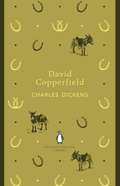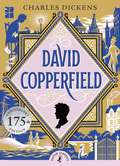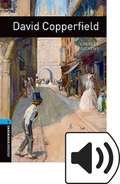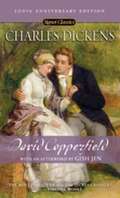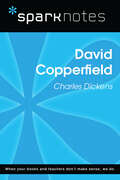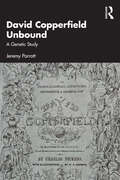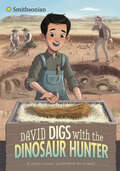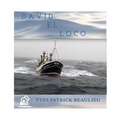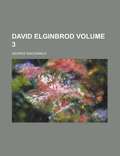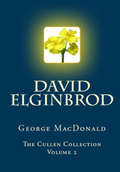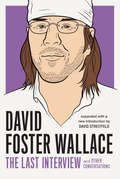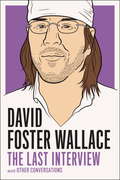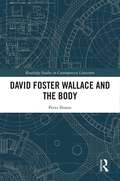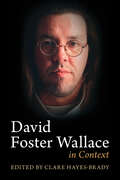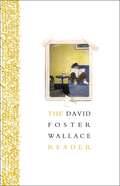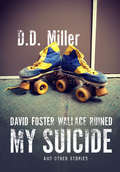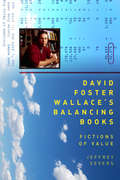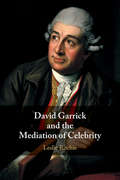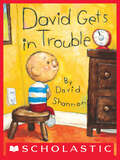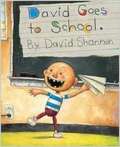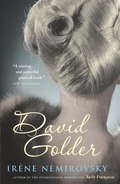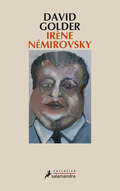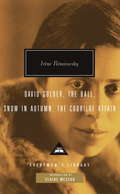- Table View
- List View
David Copperfield (The Penguin English Library)
by Charles DickensNow a major film directed by Armando Iannucci, starring Dev Patel, Tilda Swinton, Hugh Laurie, Peter Capaldi and Ben WhishawDickens's epic, exuberant novel is one of the greatest coming-of-age stories in literature. It chronicles David Copperfield's extraordinary journey through life, as he encounters villains, saviours, eccentrics and grotesques, including the wicked Mr Murdstone, stout-hearted Peggotty, formidable Betsey Trotwood, impecunious Micawber and odious Uriah Heep.Dickens's great Bildungsroman (based, in part, on his own boyhood, and which he described as a 'favourite child') is a work filled with life, both comic and tragic.
David Copperfield
by Charles DickensRediscover the Puffin Classics collection and bring the best-loved classics to a new generation - including this stunning 175th anniversary edition of David Copperfield complete with a bold brand new cover.Of all my books, I like this the best - Charles DickensFull of tragedy and comedy in equal measure and based in part on the author's own life, David Copperfield remains one of the most enduring and popular of Dickens' novels.Among the memorable cast of characters he encounters along the way are his brutal stepfather, Mr Murdstone; bubbly Nurse Peggotty; his brilliant, but unworthy schoolmate Steerforth, his eccentric aunt, Betsy Trotwood, the scheming clerk Uriah Heep, the enchanting Dora and the magnificent Mr Macawber - a character much like Dickens' own father.Also available: 9780241663547 David Copperfield Puffin Clothbound Classic
David Copperfield
by Charles Dickens Clare WestThis award-winning collection of adapted classic literature and original stories develops reading skills.
David Copperfield: (200th Anniversary Edition)
by Gish Jen Charles Dickens" Like so many fond parents I have in my heart of hearts a favourite child," wrote Charles Dickens. "And his name is David Copperfield." Of all of Dickens's novels, David Copperfield most closely reflects the events of his own life. The story of an abandoned waif who discovers life and love in an indifferent world, this classic tale of childhood is populated with a cast of eccentrics, innocents, and villains who number among the author's greatest creations. "David Copperfield is filled with characters of the most astonishing variety, vividness, and originality," noted Somerset Maugham. "They are not realistic and yet they abound with life. There never were such people as the Micawbers, Pegotty and Barkis, Traddles, Betsey Trotwood and Mr. Dick, Uriah Heep and his mother. They are fantastic inventions of Dickens's exultant imagination, but they have so much vigor, they are so consistent, they are presented with so much conviction, that you believe in them. They are extravagant, but not unreal, and when you have once to know them you can never quite forget them." T. S. Eliot agreed: "Dickens excelled in character; in the creation of characters of greater intensity than human beings." And Virginia Woolf concluded: "In David Copperfield, though char-acters swarm and life flows into every creek and cranny, some common feelings--youth, gaiety, hope--envelops the tumult, brings the scattered parts together, and invests the most perfect of all the Dickens novels with an atmosphere of beauty." The Modern Library has played a significant role in American cultural life for the better part of a century. The series was founded in 1917 by the publishers Boni and Liveright and eight years later acquired by Bennett Cerf and Donald Klopfer. It provided the foun-dation for their next publishing venture, Random House. The Modern Library has been a staple of the American book trade, providing readers with affordable hardbound editions of important works of literature and thought. For the Modern Library's seventy-fifth anniversary, Random House redesigned the series, restoring as its emblem the running torchbearer created by Lucian Bernhard in 1925 and refurbishing jackets, bindings, and type, as well as inaugurating a new program of selecting titles. The Modern Library continues to provide the world's best books, at the best prices.
David Copperfield (SparkNotes Literature Guide Series)
by SparkNotesDavid Copperfield (SparkNotes Literature Guide) by Charles Dickens Making the reading experience fun! Created by Harvard students for students everywhere, SparkNotes is a new breed of study guide: smarter, better, faster.Geared to what today's students need to know, SparkNotes provides:chapter-by-chapter analysis explanations of key themes, motifs, and symbols a review quiz and essay topics Lively and accessible, these guides are perfect for late-night studying and writing papers.
David Copperfield Unbound: A Genetic Study
by null Jeremy ParrottDavid Copperfield was Dickens's most personal novel, a first-person narrative that reworked details of both the author's lived experience and his complex psychological profile. The present study is a highly original exploration of the sources and motivations underpinning this canonical work, treated here as a melting pot of ideas and a proto-modernist masterpiece. Jeremy Parrott casts himself as a literary detective, tracking down clues hidden in the text, following in Dickens's footsteps, and laying bare a previously unsuspected symbolic scaffolding which ranges across Greek mythology, English history, Romantic poetry, and the latest advances in science. Following the example set by Betsey Trotwood, every proper name in this enormously rich text is subjected to rigorous analysis, laying bare the deepest currents of Dickens's mind and showing him to be an even greater artist than previously imagined. From the search for an elephant in Great Yarmouth to the discovery of the mysterious reader whom Dickens loved in 1850, this engaging and readable study will radically alter what you thought you knew about the best-loved Victorian novelist and his own 'favourite child'.
David Digs with the Dinosaur Hunter (Smithsonian Historical Fiction)
by Ailynn CollinsWhen David and his parents arrive in Lusk, Wyoming, in 1889, they are not welcomed with open arms. As Chinese immigrants, they are all too familiar with the discrimination they immediately encounter at the general store. Nonetheless, their need to earn money before continuing eastward leads them to find work at John Bell Hatcher’s archaeological dig site just outside of town. Soon David learns that the brilliant paleontologist is on the hunt for dinosaur bones! Can he help Hatcher make the dino discovery of a lifetime?
David el loco
by Yves Patrick BeaulieuDespués de despertar del coma, David Langelier se encuentra en una situación bastante increíble, a bordo de un tren que lo lleva a Gaspésie, al otro extremo de Quebec. Ha perdido la memoria, pero conoce su identidad porque tiene la billetera en el bolsillo. Fue víctima de un accidente y desde entonces se encuentra en coma, en una habitación del Hôtel-Dieu de Amos, localidad de Abitibi. Una tarde, bajo la lluvia torrencial, sale del hospital y se pierde por las calles de la ciudad. Muy debilitado tras meses de reposo en cama, divisó una estación y se refugió en un vagón de tren de la Canadian National, exhausto pero extrañamente contento con las circunstancias. Al abrigo de la lluvia, cae en un sueño profundo... Así comienza el tercer volumen de la saga Abitibi. En Gaspésie
David Elginbrod
by George MacdonaldA novel of Scottish country life, in the dialect of Aberdeen. A story of humble life, centering in two saintly personalities, a dignified and pious Scottish peasant, and his daughter. A vein of mysticism runs through the story, and mesmerism and electro-biology are introduced.
David Elginbrod: Novel (The Cullen Collection #2)
by George MacDonald&“A novel which is the work of a man of genius&”—and that launched MacDonald&’s career as one of the preeminent Victorian novelists of his day (The Times). George MacDonald&’s first realistic novel, David Elginbrod, was published in 1863. Unable to get his poetry and fantasy published, one of MacDonald&’s publishers remarked, &“I tell you, Mr. MacDonald, if you would but write novels, you would find all the publishers saving up to buy them of you. Nothing but fiction pays.&” Eventually MacDonald decided to try his hand at realistic fiction, and his publisher&’s words proved prophetic—within a few years publishers indeed were lining up to buy his books. Partially set in MacDonald&’s homeland of northern Scotland, the story of Hugh Sutherland and Margaret Elginbrod is replete with the dialect and thorough &“Scottishness&” that became MacDonald&’s trademark. The story takes the characters into the eerie world of the occult and spiritualism that so fascinated Victorian readers. This new edition by MacDonald biographer Michael Phillips streamlines the occasionally ponderous Victorian narrative style and updates the thick Doric brogue into readable English.
David Foster Wallace: and Other Conversations (The Last Interview Series)
by David Streitfeld David Foster WallaceAn expanded edition featuring new interviews and an introduction by the editor, a New York Times journalist and friend of the authorA unique selection of the best interviews given by David Foster Wallace, including the last he gave before his suicide in 2008. Complete with an introduction by Foster Wallace's friend and NY Times journalist, David Streitfeld. And including a new, never-before-published interview between Streitfeld and Wallace.
David Foster Wallace: and Other Conversations (The Last Interview Series)
by David Foster WallaceIn intimate and eloquent interviews, including the last he gave before his suicide, the writer hailed by A.O. Scott of The New York Times as "the best mind of his generation" considers the state of modern America, entertainment and discipline, adulthood, literature, and his own inimitable writing style.In addition to Wallace's last interview, the volume features a conversation with Dave Eggers, a revealing Q&A with the magazine of his alma mater Amherst, his famous Salon interview with Laura Miller following the publication of Infinite Jest, and more.These conversations showcase and illuminate the traits for which Wallace remains so beloved: his incomparable humility and enormous erudition, his wit, sensitivity, and humanity. As he eloquently describes his writing process and motivations, displays his curiosity by time and again turning the tables on his interviewers, and delivers thoughtful, idiosyncratic views on literature, politics, entertainment and discipline, and the state of modern America, a fuller picture of this remarkable mind is revealed.
David Foster Wallace and the Body (Routledge Studies in Contemporary Literature)
by Peter SloaneDavid Foster Wallace and the Body is the first full-length study to focus on Wallace’s career-long fascination with the human body and the textual representation of the body. The book provides engaging, accessible close readings that highlight the importance of the overlooked, and yet central theme of all of this major American author’s works: having a body. Wallace repeatedly made clear that good fiction is about what it means to be a ‘human being’. A large part of what that means is having a body, and being conscious of the conflicts that arise, morally and physically, as a result; a fact with which, as Wallace forcefully and convincingly argues, we all desire ‘to be reconciled’. Given the ubiquity of the themes of embodiment in Wallace’s work, this study is an important addition to an expanding field. The book also opens up the themes addressed to interrogate aspects of contemporary literature, culture, and society more generally, placing Wallace’s works in the history of literary and philosophical engagements with the brute fact of embodiment.
David Foster Wallace in Context (Literature in Context)
by Clare Hayes-BradyDavid Foster Wallace is regarded as one of the most important American writers of the twentieth and twenty-first centuries. This book introduces readers to the literary, philosophical and political contexts of Wallace's work. An accessible and useable resource, this volume conceptualizes his work within long-standing critical traditions and with a new awareness of his importance for American literary studies. It shows the range of issues and contexts that inform the work and reading of David Foster Wallace, connecting his writing to diverse ideas, periods and themes. Essays cover topics on gender, sex, violence, race, philosophy, poetry and geography, among many others, guiding new and long-standing readers in understanding the work and influence of this important writer.
The David Foster Wallace Reader
by David Foster WallaceWhere do you begin with a writer as original and brilliant as David Foster Wallace? Here--with a carefully considered selection of his extraordinary body of work, chosen by a range of great writers, critics, and those who worked with him most closely. This volume presents his most dazzling, funniest, and most heartbreaking work--essays like his famous cruise-ship piece, "A Supposedly Fun Thing I'll Never Do Again," excerpts from his novels The Broom of the System, Infinite Jest, and The Pale King, and legendary stories like "The Depressed Person." Wallace's explorations of morality, self-consciousness, addiction, sports, love, and the many other subjects that occupied him are represented here in both fiction and nonfiction. Collected for the first time are Wallace's first published story, "The View from Planet Trillaphon as Seen In Relation to the Bad Thing" and a selection of his work as a writing instructor, including reading lists, grammar guides, and general guidelines for his students. A dozen writers and critics, including Hari Kunzru, Anne Fadiman, and Nam Le, add afterwords to favorite pieces, expanding our appreciation of the unique pleasures of Wallace's writing. The result is an astonishing volume that shows the breadth and range of "one of America's most daring and talented writers" (Los Angeles Times Book Review) whose work was full of humor, insight, and beauty.
David Foster Wallace Ruined My Suicide And Other Stories
by D. D. MillerFilled with burning parade floats, bear attacks and roller derby leagues, D.D. Miller's short stories present us with a comical collection of slacker heroes who get what they deserve in unexpected ways. These men are survivors who fail to see how fortunate they are, and who watch helplessly as their lives unravel, if only because they fail to act. Miller's deft sentences and sharp characterization bring these stories to life, pulling his readers into the lives of these often self-centred underdogs, where the readers find themselves sympathizing with the characters while still laughing at the mishaps Miller has artfully scattered in his characters' paths.
David Foster Wallace's Balancing Books: Fictions of Value
by Jeffrey SeversThe writing of David Foster Wallace transformed the root and branch of contemporary fiction, introducing a formal inventiveness that moved authors away from an emotionless postmodern irony. Critics have pointed to Wallace’s exploration of morality and a return to sincerity as the central concerns of his work. However, as Jeffrey Severs argues in David Foster Wallace’s Balancing Books, the author was also deeply engaged with the social, political, and economic issues of the twentieth and twenty-first centuries. A rebellious economic thinker, Wallace not only satirized the deforming effects of money but also questioned the logic of the monetary system. In his original readings of all of Wallace’s fiction, from The Broom of the System and Infinite Jest to the story collections and The Pale King, Severs reveals Wallace to be a thoroughly political writer whose works provide an often surreal history of financial crises and neoliberal policies.As Severs demonstrates, balance and value are crucial to the work of Wallace, who constantly asks us to consider what we value and why. The concept of value is where his major interests intersected: economics, work, metaphysics, mathematics, and morality. Severs also details how Wallace’s writing explores the quest for balance in a world of excess and entropy. Wallace showed characters struggling to place two feet on the ground and restlessly sought to balance the books of a chaotic culture. Explaining why Wallace’s work has galvanized a new phase in contemporary global literature, Severs draws connections to key forerunners Don DeLillo, Thomas Pynchon, and William Gaddis, as well as successors-including Dave Eggers, Teddy Wayne, Jonathan Lethem, and Zadie Smith-interpreting Wallace’s legacy in terms of finance, the gift, and office life.
David Foster Wallace's Balancing Books: Fictions of Value
by Jeffrey SeversWhat do we value? Why do we value it? And in a neoliberal age, can morality ever displace money as the primary means of defining value? These are the questions that drove David Foster Wallace, a writer widely credited with changing the face of contemporary fiction and moving it beyond an emotionless postmodern irony. Jeffrey Severs argues in David Foster Wallace's Balancing Books that Wallace was also deeply engaged with the social, political, and economic issues of the twentieth and twenty-first centuries. A rebellious economic thinker, Wallace satirized the deforming effects of money, questioned the logic of the monetary system, and saw the world through the lens of value's many hidden and untapped meanings. In original readings of all of Wallace's fiction, from The Broom of the System and Infinite Jest to his story collections and The Pale King, Severs reveals Wallace to be a thoroughly political writer whose works provide an often surreal history of financial crises and economic policies.As Severs demonstrates, the concept of value occupied the intersection of Wallace's major interests: economics, work, metaphysics, mathematics, and morality. Severs ranges from the Great Depression and the New Deal to the realms of finance, insurance, and taxation to detail Wallace's quest for balance and grace in a world of excess and entropy. Wallace showed characters struggling to place two feet on the ground and restlessly sought to "balance the books" of a chaotic culture. Explaining why Wallace's work has galvanized a new phase in contemporary global literature, Severs draws connections to key Wallace forerunners Don DeLillo, Thomas Pynchon, and William Gaddis, as well as his successors—including Dave Eggers, Teddy Wayne, Jonathan Lethem, and Zadie Smith—interpreting Wallace's legacy in terms of finance, the gift, and office life.
David Garrick and the Mediation of Celebrity
by Leslie RitchieWhat happens when an actor owns shares in the stage on which he performs and the newspapers that review his performances? Celebrity that lasts over 240 years. From 1741, David Garrick dominated the London theatre world as the progenitor of a new 'natural' style of acting. From 1747 to 1776, he was a part-owner and manager of Drury Lane, controlling most aspects of the theatre's life. In a spectacular foreshadowing of today's media convergences, he also owned shares in papers including the St James's Chronicle and the Public Advertiser, which advertised and reviewed Drury Lane's theatrical productions. This book explores the nearly inconceivable level of cultural power generated by Garrick's entrepreneurial manufacture and mediation of his own celebrity. Using new technologies and extensive archival research, this book uncovers fresh material concerning Garrick's ownership and manipulation of the media, offering timely reflections for theatre history and media studies.
David Gets in Trouble
by David ShannonNow it is David's turn to speak, and it turns out that "no" is a big part of his vocabulary. Of course, when his mom says "no", it's because she worries about his safety and she wants him to grow up to be a good person. Deep down, she's really saying, "I love you". But when David says "no," it usually means "I don't want to get in trouble!"
David Gets in Trouble
by David ShannonCaldecott Honor artist and bestseller David Shannon make readers laugh aloud in this next story about the troublemaking David!"When David gets in trouble, he always says . . . 'NO! It's not my fault! I didn't mean to! It was an accident!'" Whatever the situation, David's got a good excuse. And no matter what he's done "wrong," it's never really his fault. Soon, though, David realizes that making excuses makes him feel bad, and saying he's sorry makes him feel better. Once again, David Shannon entertains us with young David's mischievous antics and a lighthearted story that's sure to leave kids (and parents) laughing.
David Goes to School
by David ShannonThere are lots of rules in school. "Don't chew gum. Don't talk without raising your hand..." and many more. David learns that only when he does a good job will his teacher say yes. When he draws on his desk, shouts out an answer, and runs to the head of the lunch line, he hears lots of "no's."
David Golder
by Irene NemirovskyIn 1929, 26-year-old Irène Némirovsky shot to fame in France with the publication of her first novel David Golder. At the time, only the most prescient would have predicted the events that led to her extraordinary final novel Suite Française and her death at Auschwitz. Yet the clues are there in this astonishingly mature story of an elderly Jewish businessman who has sold his soul.Golder is a superb creation. Born into poverty on the Black Sea, he has clawed his way to fabulous wealth by speculating on gold and oil. When the novel opens, he is at work in his magnificent Parisian apartment while his wife and beloved daughter, Joy, spend his money at their villa in Biarritz. But Golder's security is fragile. For years he has defended his business interests from cut-throat competitors. Now his health is beginning to show the strain. As his body betrays him, so too do his wife and child, leaving him to decide which to pursue: revenge or altruism?Available for the first time since 1930, David Golder is a page-turningly chilling and brilliant portrait of the frenzied capitalism of the 1920s and a universal parable about the mirage of wealth.From the Trade Paperback edition.
David Golder
by Irène NémirovskyAcogida por la crítica como una obra maestra. El comienzo de una carrera literaria que situaría a Némirovsky entre los más grandes escritores franceses del siglo XX. Tomando como modelo la figura de sus padres, arquetipos del millonario hecho a sí mismo y la esposa egocéntrica y despilfarradora, Némirovsky despliega su aguda percepción psicológica en la descripción del mundo de los grandes negocios, territorio de personajes sin escrúpulos en el que la voracidad de los hombres es tan grande como la precariedad de sus fortunas. David Golder es un banquero caído en desgracia tras una grave crisis cardiaca sufrida en un casino de la Costa Azul. Cuando las malas noticias sobre la salud del financiero se extienden, las acciones de sus empresas se desploman. Así, de la noche a la mañana, Golder se encuentra en la bancarrota; arruinado, enfermo y abandonado por su mujer y su única hija, se recluye en un piso vacío de París. Si bien ha perdido todo, aún conserva el espíritu luchador y el amor por el riesgo que le permitieron abandonar el mísero gueto ucraniano donde nació y convertirse en uno de los hombres más acaudalados de Francia. Cuando la oportunidad de enriquecerse de nuevo se presenta ante él, Golder no dudará un segundo en lanzarse a la aventura, lo que lo llevará a algunos escenarios de su juventud. El riesgo, nada menos que su propia vida, es grande, pero la ganancia es, a sus ojos, aún mayor: obtener una fortuna superior a la anterior y recuperar a su hija, la única persona que ha amado en este mundo. La crítica ha dicho...«Escrita con un manejo envidiable del diálogo y el discurso indirecto libre, esta novela de Némirovsky (...) es una prueba notoria del talento de una escritora que se propuso retratar las contradicciones y las miserias de la clase a la que pertenecía.»Página12 «David Golder es ante todo una gran novela de escritura penetrante, diálogos memorables e incisiva caracterización psicológica. El manejo del discurso libre indirecto es soberbio.»La Razón «Su trazo expresionista descubre a una escritora de talento que retrata el ansia bestial del hombre por el tener.»El Mundo «Leer una sola de sus secas, despiadadas y sombrías páginas y enamorarse inmediatamente de esta escritora, de extraordinaria lucidez y de tremendo y trágico final, es todo uno.»ABC
David Golder, The Ball, Snow in Autumn, The Courilof Affair
by Irene Nemirovsky Sandra Smith(Book Jacket Status: Jacketed)Readers everywhere were introduced to the work of Irène Némirovsky through the publication of her long-lost masterpiece, Suite Française. But Suite Française was only the coda to the brief yet remarkably prolific career of this nearly forgotten, magnificent novelist. Here in one volume are four of Némirovsky's other novels-all of them newly translated by the award-winning Sandra Smith, and all, except DAVID GOLDER, available in English for the first time.DAVID GOLDER is the novel that established Néirovsky's reputation in France in 1929 when she was twenty-six. It is a novel about greed and lonliness, the story of a self-made business man, once wealthy, now suffering a breakdown as he nears the lonely end of his life. THE COURILOF AFFAIR tells the story of a Russian revolutionary living out his last days-and his recollections of his first infamous assassination. Also included are two short, gemlike novels: THE BALL, a pointed exploration of adolescence and the obsession with status among the bourgeoisie; and SNOW IN AUTUMN, an evocative tale of White Russian émigrés in Paris after the Russian Revolution.Introduced by celebrated novelist Claire Messud, this collection of four spellbinding novels offers the same storytelling mastery, powerful clarity of language, and empathic grasp of human behavior that would give shape to Suite Française.From the Hardcover edition.
